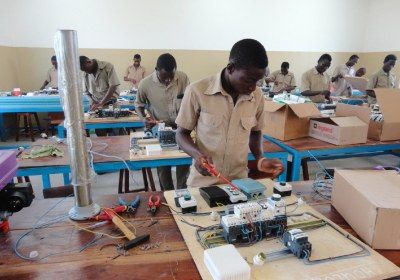Technical and Vocational Education and Training (TVET) is often considered as the industrial backbone of any economy. Therefore, its importance in nation-building cannot be downplayed.
As a tool primarily for skill acquisition and training people for self-employment, TVET can also go a long way to help deal with the rising unemployment rate.
Consequently, governments the world over place a lot of premium on its development for accelerated national growth.
We, therefore, note with satisfaction the government’s efforts at investing over GH¢3 billion to boost and strengthen TVET in order to create employment opportunities for the youth of the country.
In our lead story in last Tuesday’s edition, the Minister of Education, Dr Matthew Opoku Prempeh, in an interview, said part of the funding was going into the upgrade of all national vocational and technical institutes (NVTIs), the re-tooling of workshops in technical universities and the two polytechnics, as well as the construction of 32 modern TVET institutions across all the 16 regions of the country.
He also disclosed that the government was expanding and upgrading 35 TVET institutions (NVTIs and Opportunities Industrialisation Centres (OICs) and establishing two new foundry and machining centres in Kumasi and Accra, at a cost of 119 million euros, the equivalent of GH¢642.60 million.
We are of the view that strengthening TVET as a critical tool to equip people with the needed skills for socio-economic and industrial development is long overdue.
Many academics have argued that without skilled technical manpower produced by the polytechnics, technical and vocational institutes for industry, commerce and agriculture, national development efforts could be undermined.
For this reason, we are happy that the government is re-emphasising the importance of TVET and skills and anchoring its key strategies around them to create employment for the youth.
We would like to encourage the government to follow through on its resolve towards the enhancement of TVET programmes, as well as ensure that the technical and professional skills needed for the socio-economic development of the country are firmly in place.
Once this is achieved, government initiatives, such as One-district, One-factory; One-district, One-warehouse; the Integrated Bauxite and Aluminium Industry, among many others, can successfully be implemented.
There is also a bill in Parliament, which is close to being passed, to enforce the realignment of all TVET institutions under the Ministry of Education.
We would like to encourage Members of Parliament to act speedily to pass this bill, which we believe will mean that all TVET schools will not only benefit from the free SHS programme currently underway but also ensure effective coordination, regulation, harmonisation, standard and improved quality of instruction in TVET delivery.
Clearly, TVET, which covers all aspects of the world of work and society, can no longer be considered a place for dropouts.
All stakeholders, including the Parliamentary Select Committee on Education, must, therefore, get involved to ensure that the energy and resources that the government is putting into that sector do not go waste.
TVET must be given the needed prominence in the scheme of things and be seen as the preferred option to general academic education to help students become better prepared for what they will encounter on the job, with industry-relevant skills that make them ready for the job market.
The need for effective implementation of TVET in the country is overwhelming, both in terms of developing human resource and as an investment with very high returns.
We cannot therefore afford to de-emphasise its impact if the country is to be abreast of technological advancement.

